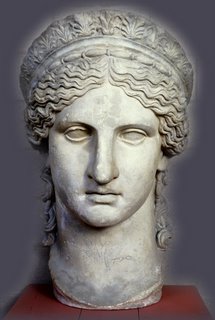Ante Diem XV Kalendas Februarias

Modern Date : January 18th
Ante Diem XV Kalendas Februarias
Fifteenth Day to the Kalends of February
This is one of the dies comitiales when committees of citizens could vote on political or criminal matters.
Columella says of this day, "Aquarius begins to rise: the southwest wind is the sign of a storm."
Clodius, who had stirred up rebellion at Rome with Julius Caesar's tacit approval, was killed when he attempted to ambush Milo at Bovillae in 52 BCE.
This month is sacred to Janus, the god of Beginnings. Janus is the porter of heaven and considered the guardian deity of gates and doors. He is often shown as two-headed since doors face both ways.
Theogamia of Hera
In Greece this day was known as the Theogamia of Hera. Hera was known as Juno to the Romans. She was also known as Saturnia to the Romans. Juno was the goddess of marriage and childbirth. She was wedded to Zeus in the Garden of the Gods where Gaea created in her honor a tree of life bearing golden fruit.
Outakai-hajime
In Japan, the annual Outakai-hajime, or poetry party, is held at Court. Poems on a given theme are selected from the entries submitted by the public and are read aloud.
Uinal of Duality
In Mayan calendar systems, this day begins the Uinal of Duality, sacred to the creator couple Ometeotl and Omecinatl, the most exalted deities in the Aztec/Mayan cosmos. The period that now begins is the thirteenth and last of the 20-day Uinals in the current cycle of the Tzolkin, or 260-day calendar (7 Imix, Tzolkin 241), and marks the point at which the cycle dissolves in a duality from which the next uinal will be born in Fire. The symbolic bird for this uinal is the Parrot, the principle that of Completion.
Putting Away the Seals
In China, sometime between the 19th and the 22nd days of the 12th moon (the propititous time was chosen by the Imperial Board of Astronomy), the Keeper of the Seals for each Ministry and Department officially retired the seals for the rest of the year, a practice followed by a jolly drinking party. This is the start of a rowdy season when restaurants and amusements places are full and beggars can steal from shops without any fear of repercussions.
Around the same time, all the theaters in Peking closed and didn't open again until New Year's Day when they performed the play, "Conferring Happiness," to open the new season. Also about this time, the school boys are released from their studies.

